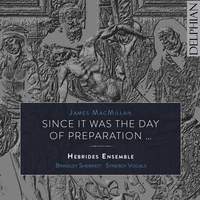Interview,
James Macmillan on 'Since it was the day of preparation…'
 Surely one of today's most successful composers, Scotland's James Macmillan is well-known for taking sacred subjects that reflect his own deeply-held religious beliefs. With two Passion settings now to his name (a John and a Luke), he's now turned to the next part of the Gospel story, namely the post-Resurrection appearances of Jesus, for a work entitled Since it was the day of Preparation....
Surely one of today's most successful composers, Scotland's James Macmillan is well-known for taking sacred subjects that reflect his own deeply-held religious beliefs. With two Passion settings now to his name (a John and a Luke), he's now turned to the next part of the Gospel story, namely the post-Resurrection appearances of Jesus, for a work entitled Since it was the day of Preparation....
I spoke to James about this 'sequel' to the traditional narrative of the Crucifixion.
Where did you first get the idea to write a piece like this, picking up where the usual Passion narrative ends?
I wrote my St John Passion in 2007 and since then I have composed a St Luke Passion. I hope to set the other two as well. When I chant the simple plainsong version of the St John in church every Good Friday, the liturgical narrative does not stop at the death of Christ but goes on for a little bit more. So, when I encounter this Passion story every year, the words "Since it was the day of Preparation" are very much a part of it.
So when I completed my St John Passion it felt unfinished. I began to think of the sequel. And the entire Resurrection story presented itself as a natural continuation. The Resurrection required a different "sound" though, and I decided on a more intimate setting with smaller forces.
Of the small chamber group that accompanies the singers, one instrument stands out as rather unexpected… What led you to include the theorbo in your scoring?
I had initially made a survey of the instrument types that are continually mentioned in scripture, Old Testament in particular - trumpets, bells, organs, strings, flutes, harps and lutes. I tried to capture these in modern instrumentation. I had seen Liz play the theorbo and lute in early music in Scotland and it seemed a good idea to have her involved, on the larger instrument.
Indeed, that “chamber” feel extends to the singers themselves – a solo quartet rather than a full choir. Are you making a conscious break from the larger sound-world of the St Luke Passion and Seven Last Words, maybe in favour of a more intimate approach?
Yes, this was the idea, as I state above. Nevertheless the work has been performed in the US where a small choir was used and soloists were taken from within. Still, the intimate, small-scale sound is important, even with a slightly larger group of singers, perhaps informed by recent scholarship on authentic Bach performances.
In Parts II and III, you juxtapose the Latin and English versions of the same texts – an unusual choice, though not an unheard-of one. What was behind this decision?
In my St John Passion I used Latin liturgical texts as points of reflection at the ends of most movements. I wanted to try a slightly different approach here, so that the reflections are more simultaneous and don't stop the onward flow of the narrative. So the Latin texts allow a 'side-ways glance' from time to time, pointing to a different perspective.
In contrast to most Passion settings and other oratorios, you’ve used many different styles of “Evangelist” throughout the piece – the quasi-plainchant tenor solos, duets and even quartets, with various different accompaniments and musical moods. What made you decide against using just one single style for these?
Because there is a very small vocal ensemble, I had to find different ways from within to tell the story. I was also keen to explore the possibilities of squeezing out various sounds and combinations in the vocal texture, so that the narrator would not be the same sound every time. Sometimes self-imposed restrictions like these can provoke a composer to seek out new inventiveness in possible solutions.
Did you collaborate with the instrumentalists on the writing for their respective solo spots (the instrumental “motets” interspersed between the texts)?
The only instrument I hadn't written for before was the theorbo, so I was in touch with Liz a lot, not just for her solo, but for general guidance in the matter.
Do you have any plans to follow the New Testament story any further – perhaps with an Ascension-themed work?
What a good idea!
'Since it was the day of preparation…' is released on 24th June on Delphian.
Available Formats: CD, MP3, FLAC, Hi-Res FLAC



